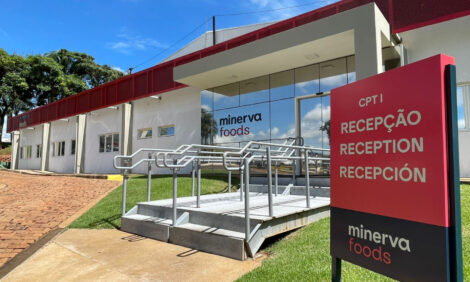



Fact Check: Bovaer’s active ingredient not detected in dairy products
Social media user's claims said to be misleadingThere is no evidence that the active ingredient in Bovaer, an emissions-reducing additive fed to cows, is present in dairy products that are eventually consumed by humans, contrary to suggestion made by social media users sharing a document that warns against direct contact with the product, according to Reuters' fact-checking team.
Dairy producer Arla Foods announced, a joint initiative with British supermarkets on Nov. 26 to trial a rollout of Bovaer across some dairy farms.
Produced by the Dutch-Swiss speciality chemicals company DSM-Firmenich, Bovaer is added to cattle feed to reduce methane emissions produced by the animal, which the UN says is a major source of climate change. DSM-Firmenich says the product is currently available for sale in 68 countries, including the UK.
Responding to the Arla Foods announcement, an Instagram user, shared a partial screenshot of a letter from the US Food and Drug Administration (FDA) that warns against human use of the active ingredient in Bovaer. It cites male fertility issues, and skin and eye irritation as potential side-effects.
The Instagram user added in the caption: “My favourite part is when it says not fit for human consumption … FYI…. @arladairyuk scum.”
The FDA letter
But the FDA letter makes no suggestion that humans come into direct contact with the active ingredient, 3-nitrooxypropanol (3-NOP), when consuming dairy products from Bovaer-fed cows.
The warning about human use in the Instagram screenshot was taken from an attachment to the letter, which is a set of instructions for diluting, dosing and adding Bovaer to cattle feed. It advises that humans should wear personal protective gear when handling the product and says it is only to be consumed by lactating dairy cows.
Spokespersons for DSM-Firmenich and Arla Foods said in separate emailed statements that Bovaer is safe for humans under its intended use as an additive in cattle feed.
The FDA and Elanco Animal Health, the company that holds licensing rights for Bovaer in the US and to whom the FDA letter was addressed, individually told Reuters that the health warning applied only to direct human use and handling of 3-NOP. It was not referring to dairy products derived from animals given the additive.
The letter also said it had no questions at the time of sending in May 2024, based on a review of information provided by Elanco as to Bovaer’s efficacy and risk to humans. It said the FDA would refrain from enforcing animal drug requirements on the product as long as this position was maintained.
What the data shows
Food safety agencies in Europe, such as the Food Standards Agency of England, Wales and Northern Ireland (FSA), Food Standards Scotland (FSS), and the EU’s European Food Safety Authority (EFSA), said dairy products from Bovaer-fed cows are safe for humans.
This is based upon advice from specialist panels who were appointed by the agencies to assess a dossier of studies and extra information supplied by DSM-Firmenich. <a href="" >https:="" efsa.onlinelibrary.wil...<="" a="">The EFSA safety review (Section 3.2) said tests in a study published in 2019, show that 3-NOP is not detectable in a cow’s plasma, milk or other edible tissues.
This is because the animal’s stomach rapidly breaks 3-NOP down into metabolites – the main one being 1,3- propanediol - which is also absorbed and mostly exhaled as cardon dioxide.
Jan Dijkstra, an associate professor in ruminant nutrition at Wageningen University in the Netherlands, said to Reuters via email that 3-NOP in dairy products cannot be officially excluded, though if present would be at “very low levels”. This means that even with highly sensitive equipment, it cannot, and has not, been identified.
Safety of 3-NOP metabolites
1,3- propanediol, the main compound - or metabolite - created when digesting Bovaer is not a cause of concern as it did not appear to accumulate in the stomach of the animal, the UK’s FSA expert panel observed.
Oli Jones, a professor of chemistry at the Royal Melbourne Institute of Technology, said 1,3- propanediol is also a commonly occurring substance in a cow’s stomach. It won’t pose a risk to humans, he added via email.3-nitrooxypropionic acid (NOPA) was found to be a major metabolite of 3-NOP when tested in rodents, but much less so in ruminants, a category of mammals that includes cows and goats.
“A very low concentration” of NOPA was detected in cow milk, according to residue studies reviewed by the EFSA (Section 3.2.2).
An EFSA spokesperson told Reuters that its expert panel had found NOPA to pose “no safety concern for the consumers of milk”, as it has not been found to have genotoxic potential.
Genotoxicity refers to any substance’s potential to damage genetic material.
The FSA expert panel also said (Section 2.2.2.2) NOPA is non-genotoxic.The EFSA added that any exposure to NOPA through dairy products would be below the health-based guidance value.
The UK’s FSA and FSS said in its safety conclusions on the dossier that it did not deem 3-NOP or NOPA to be a concern in milk and edible tissues.
Any intake would be within the accepted daily intake, the FSA and FSS said.
A spokesperson for the FSA told Reuters via email: “Milk from cows given Bovaer, a feed additive used to reduce methane emissions, is safe to drink. Bovaer has undergone rigorous safety assessments and is approved for use in Great Britain.
”The FSS did not immediately respond to Reuters’ request for comment.
Verdict
Misleading. Bovaer’s active ingredient was not detected in the milk of cows who were given the additive. Small concentrations of one of its metabolites was found, but assessments by expert panels appointed by food safety agencies say there are no safety concerns for humans.
This article was produced by the Reuters Fact Check team.



